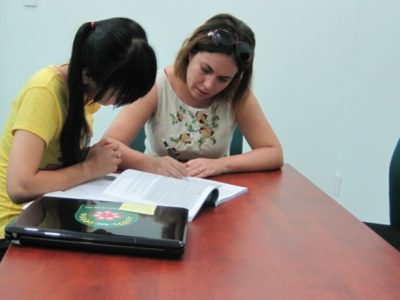At the beginning of the semester, you are given the most important and life-changing information you may ever receive in your life: your professors’ office hours. Write the times down. Memorize them. Listen to your professors. Your professors can help you with so much more than just your classwork. Live and breathe office hours. If you’re planning on taking a job after college, pay attention, because the networking you do in office hours could be the foot in the door you need later on.
Sure, you can go to the career fair, your student resource center and all other resources your university offers. But perhaps the most useful and dramatically underused resource of all? The professors. Your professors, like all other aspects of college, are there to help you get that job, so use them.
This semester one of my old professors wrote me a killer recommendation letter for an internship that I really wanted. Another introduced me to an old friend of his who’d worked in my dream field and a third offered to set me up with a director at the Iowa Department of Cultural Affairs, where any movie filming in Iowa has to go for permission to film on location. Doesn’t that sound sweet? That’s three fantastic opportunities in my field, and they all came from the people who I thought would only be grading my papers.
Professors are actually one of the best resources you will ever have in college, and yet somehow students don’t realize that until it’s too late. University of Iowa journalism professor John Kenyon said that in one class, which included mostly seniors, the majority of students didn’t ask him about anything related to their upcoming entrance into the workforce. “I had a couple of students who came in to talk about papers, but not as much about networking,” Kenyon said. “It seemed that the class wasn’t aware that they were graduating in a couple of weeks and they needed to start spreading their roots.” Way to miss an opportunity.
Kenyon brought in speakers throughout the class that he thought would connect with what his students would be doing in the next few years of their lives or would encounter in their jobs someday.
UI journalism professor Heather Spangler said that students come in to meet with her to receive help with their futures. “I advise and teach more than 200 students every semester, and it’s hard to get to know everyone as well as I’d like, but meaningful interactions with great students make my job a lot of fun,” Spangler said. She meets with four or five students a week to brainstorm and talk about resumes, and she writes about five recommendation letters a semester. One of those letters could have your name on it if you start utilizing those office hours.
But why aren’t students taking full advantage of these opportunities? “I think sometimes students don’t realize how valuable and unique the opportunities like the [career center] and networking events are while they’re in school, and don’t take advantage because they’re out of their routine or out of their comfort zone,” Spangler said.
Admittedly, going to some of these events is overwhelming, and sometimes they fill up and you just don’t have the opportunity to fully capture all they have to offer. Your professors, however, are always available and, believe it or not, they want to help you.
I know what you’re thinking. “My professor wasn’t trying to help me with that Calc 3 final.” But, trust me, they are truly invested in your future. Those finals you hate aren’t just about getting the grade—your professors really are trying to make sure you understand that what they are teaching you is applicable to your future. “I think students sometimes feel a distance between their professors that doesn’t have to be there,” Spangler said. “Faculty members are here because we’re passionate about our area of study. If students show interest and aptitude in the same area, it’s a joy to interact with them and help them make other connections in the field.”
Networking isn’t something that you should leave until your last year of school. The last thing you want is to be a graduated senior with no connections. Your teachers are a valuable resource that can make all the difference. You never know whom your professors might be friends with or what speakers they might bring in. If you spend time with them, they’ll help you figure out exactly what you need for the next few years of your life. If your university’s resources aren’t what you need, a professor’s might be.
“You guys are adults and it’s up to you to figure out what you need, but I think the school can work harder to get these opportunities in front of you,” Kenyon said. “After that it’s your responsibility to take charge.”



















